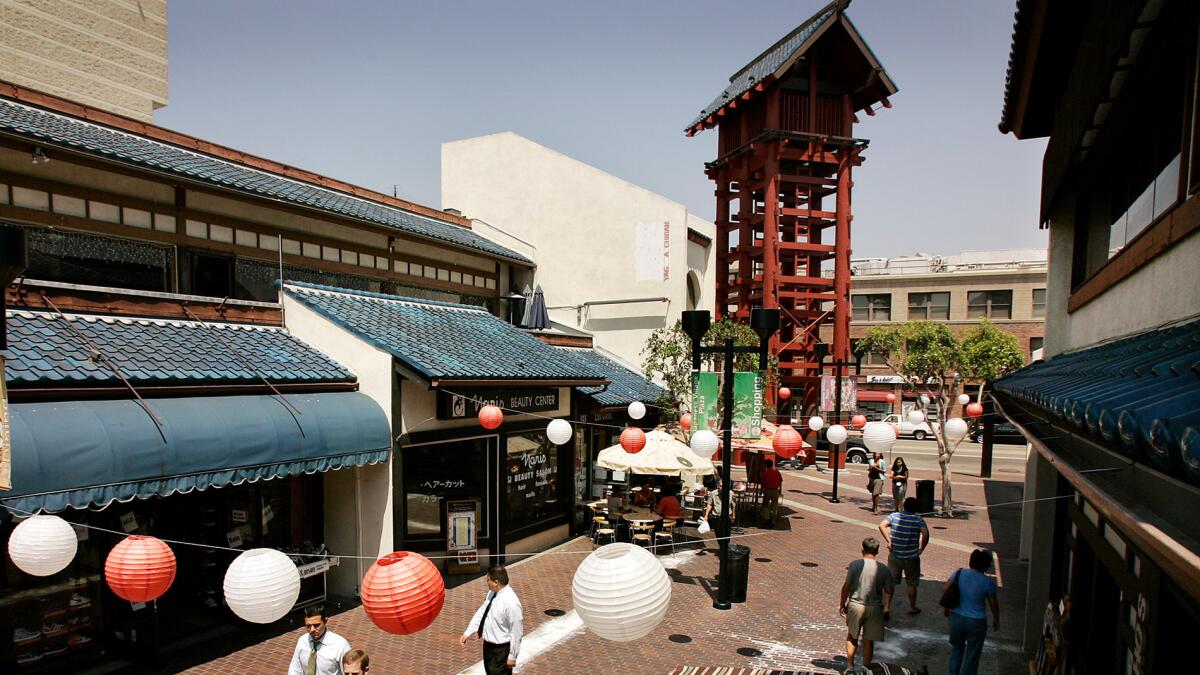Judge refuses to halt subway project after Little Tokyo mall lawsuit

A Los Angeles County Superior Court judge denied a request Thursday from Little Tokyo property owners to immediately halt construction on a $1.5-billion subway project in downtown Los Angeles.
The decision came in response to a lawsuit and restraining order request filed by the Japanese Village pedestrian mall Wednesday alleging that the Metropolitan Transportation Authority and two construction companies planned to inject a cement-like substance into the soil beneath the shopping area without securing the necessary property easements.
Japanese Village’s attorney had sought to stop construction until Metro obtained the easements needed to perform the work.
A Metro spokesman said Thursday that the agency “remains confident” that the necessary permits and easements are in place to continue to prepare for tunneling, which is expected to begin later this year.
The Downtown Regional Connector is a 1.9-mile set of tunnels that will snake from the eastern edge of Little Tokyo to a rail hub along 7th Street in the Financial District.
The project, slated for completion in 2020, is designed to allow rail passengers to seamlessly move through downtown without changing trains. Right now, for example, riders coming from Santa Monica must get off the Expo Line and transfer to the subway, then the Gold Line, to reach East L.A. or Azusa.
Although tunneling has not yet begun, work on the project is behind schedule and about 9% over its original budget.
The line will add three new train stations in downtown Los Angeles: at 1st Street and Central Avenue, 2nd Street and Broadway, and 2nd and Hope streets.
The tunnels will primarily run beneath streets or government land, but will also intersect the Japanese Village development.
Crews plan to inject cement into the soil there to compensate for the settling that will occur during tunneling. That technique, known as grouting, is common on major construction projects.
But Metro has not secured the rights to the land that sits directly outside the tunnels but underneath the soil, according to Japanese Village’s request for a temporary restraining order.
Staff for the Regional Connector Constructors, a joint venture between Skanska USA and Traylor Bros., told Metro months ago that agency staff had failed to secure all the needed easements, said Bob Crockett, the attorney representing the Japanese Village.
“Rather than delay the project … Metro decided to go ahead and just inject the concrete,” Crockett said.
A Regional Connector Constructors engineer said in a deposition last month that crews planned to move forward with the work anyway, according to court documents. The restraining order request called the action “a risky gamble that will lead to an invasion of Japanese Village’s property interests.”
“It’s hard for a judge to stop a major project like this,” Crockett said, adding that a judge may instead tell the mall’s holding company to sue for any damages once construction is over. But, he said, “we’re trying to stop it before the fact.”
Earlier this year, Crockett said, construction crews on the project did some grouting on the western end of the plaza, raising the paving and causing some damage.
This complaint marks the third lawsuit that the Japanese Village has filed over the Regional Connector. The group lost a state environmental lawsuit in 2012, and an appeal on a federal environmental lawsuit is pending.
For more transportation news, follow @laura_nelson on Twitter.
ALSO
San Diego moves to ban single-use plastic bags
Los Feliz home where Walt Disney set up his first studio could be demolished
Trump campaign pays Costa Mesa over $15,000 for costs of policing rally
UPDATES:
2:50 p.m., July 21: This article was updated with the judge’s denial of a temporary restraining order, and comment from Metro.
This article was originally published at 9:10 p.m., July 20.
More to Read
Start your day right
Sign up for Essential California for news, features and recommendations from the L.A. Times and beyond in your inbox six days a week.
You may occasionally receive promotional content from the Los Angeles Times.







